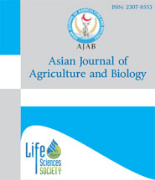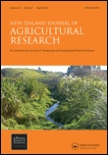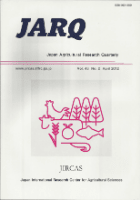
AgroLife Scientific Journal
Scope & Guideline
Cultivating Knowledge, Nurturing Innovation.
Introduction
Aims and Scopes
- Sustainable Agriculture Practices:
Research focusing on sustainable farming techniques, organic agriculture, and the environmental impact of agricultural practices. - Crop Production and Improvement:
Studies aimed at enhancing crop yield, quality, and resistance to biotic and abiotic stresses through various agronomic and genetic approaches. - Soil Science and Management:
Investigations into soil properties, fertility, management practices, and the impact of agriculture on soil health and ecosystem services. - Agroecology and Biodiversity:
Research on the relationships between agricultural practices and biodiversity, including the conservation of agro-biodiversity and ecosystem services. - Food Safety and Quality:
Studies addressing food safety, quality assurance, and the nutritional properties of agricultural products. - Innovative Agricultural Technologies:
Exploration of new technologies in agriculture, including precision farming, biotechnology, and remote sensing applications. - Animal Science and Veterinary Research:
Research related to livestock management, animal health, and veterinary practices to improve productivity and animal welfare.
Trending and Emerging
- Climate Change Impact on Agriculture:
Research focusing on the effects of climate change on agricultural productivity and strategies for adaptation and mitigation is increasingly prevalent, underscoring the urgency of addressing climate-related challenges. - Biological Control and Organic Practices:
There is a growing interest in biological control methods and organic farming practices, reflecting a shift towards sustainable agriculture and reduced reliance on synthetic chemicals. - Agroecological Practices and Resilience:
Emerging studies are emphasizing agroecological practices that enhance resilience and sustainability in farming systems, aligning with global sustainability goals. - Precision Agriculture Technologies:
The use of precision agriculture technologies, such as remote sensing and data analytics, is gaining momentum, showcasing the integration of technology in modern farming. - Food Security and Nutritional Quality:
Research addressing food security challenges, including the nutritional quality of food produced through sustainable practices, is increasingly important in the context of global food systems. - Integration of Biotechnology in Agriculture:
The application of biotechnology for crop improvement, pest resistance, and sustainable practices is on the rise, indicating an interest in innovative solutions for agricultural challenges.
Declining or Waning
- Traditional Pest Control Methods:
There has been a noticeable decrease in studies focusing on conventional pest control techniques, possibly due to a growing interest in integrated pest management and organic approaches. - Chemical Fertilizers and Agrochemicals:
Research on the use of chemical fertilizers and agrochemicals is declining, reflecting a shift towards organic farming and sustainable practices. - Livestock Production Systems:
While still relevant, the focus on traditional livestock production systems is diminishing as more attention is directed towards sustainable and alternative livestock management practices. - General Agricultural Policy Studies:
Research that broadly addresses agricultural policies without a specific focus on implementation or outcomes has decreased, indicating a preference for more targeted studies. - Soil Pollution Studies:
There is a reduced emphasis on soil pollution studies, potentially due to a shift towards broader ecological impacts and sustainable land management practices.
Similar Journals

Asian Journal of Agriculture and Biology
Empowering research for sustainable growth in Asia.Welcome to the Asian Journal of Agriculture and Biology, a premier open access journal published by LIFE SCIENCES SOC PAKISTAN, dedicated to advancing research in the fields of agricultural and biological sciences. Since its inception in 2013, this journal has provided a vital platform for scholars and practitioners to disseminate novel findings and innovative methodologies that contribute to the betterment of agricultural practices and biological research. With an impressive H-Index and ranked in the Q3 category across multiple disciplines including Agricultural and Biological Sciences, Biochemistry, Genetics, and Molecular Biology, as well as Medicine, the journal showcases high-quality research that influences both academic and practical applications globally. The journal is indexed in Scopus, reinforcing its commitment to high academic standards and providing researchers with efficient access to significant knowledge. Based in Pakistan, the Asian Journal of Agriculture and Biology is your gateway to staying abreast of the latest trends and discoveries that support sustainable development and health sciences.

SCIENTIA AGRICOLA
Pioneering research in the realm of agricultural sciences.SCIENTIA AGRICOLA is a prestigious, peer-reviewed journal published by UNIV SAO PAULO, ESALQ, dedicated to advancing the field of agricultural sciences. With the ISSN 1678-992X and an e-ISSN maintaining the same number, this Open Access journal has been a valuable resource since 1992, fostering wide dissemination of knowledge and research findings in agriculture. Hailing from Piracicaba, Brazil, associated with one of the leading agricultural universities, SCIENTIA AGRICOLA serves as an essential platform for researchers, practitioners, and students aiming to explore innovative agricultural practices, crop production, and sustainable techniques. Although specific metrics such as H-Index and Scopus Ranks were not provided, the journal's longstanding commitment to open access and impactful research underscores its importance in contributing to the global dialogue on agricultural efficiency and sustainability.

NEW ZEALAND JOURNAL OF AGRICULTURAL RESEARCH
Elevating Agricultural Practices Through Scholarly ResearchNEW ZEALAND JOURNAL OF AGRICULTURAL RESEARCH is a prestigious, peer-reviewed journal published by Taylor & Francis Ltd that has been at the forefront of agricultural science since its inception in 1958. With a strong focus on the fields of Agronomy and Crop Science, Animal Science and Zoology, Plant Science, and Soil Science, this journal has established itself in the academic community, achieving a notable Q2 ranking in various agricultural categories as of 2023. The journal thrives on its commitment to disseminating cutting-edge research and innovative practices that address contemporary challenges in agriculture. Although it does not currently offer an open access option, its valuable contributions can be accessed through various academic platforms, ensuring that vital research reaches a wide audience of researchers, professionals, and students globally. The journal's continued relevance and authority are reflected in its strong Scopus rankings, further emphasizing its role as a critical journal within the agricultural sciences.

Journal of Tekirdag Agriculture Faculty-Tekirdag Ziraat Fakultesi Dergisi
Pioneering research in agriculture and biological sciences.The Journal of Tekirdag Agriculture Faculty-Tekirdag Ziraat Fakultesi Dergisi, published by UNIV NAMIK KEMAL, represents a significant platform dedicated to the dissemination of research in the fields of agricultural and biological sciences. With an ISSN of 1302-7050 and E-ISSN 2146-5894, this journal aims to advance knowledge and innovation within its scope, which encompasses a diverse array of agricultural topics and environmental pollution. Notably, it has achieved a Q3 category ranking in Agricultural and Biological Sciences and a Q4 category ranking in Pollution for 2023, reflecting its growing influence in the academic community. Operating from Turkey, the journal publishes articles that seek to address contemporary challenges in agriculture and environmental science, thus fostering collaborations among researchers, professionals, and students worldwide. Researchers can benefit from the journal’s focus on applied sciences, providing insights and solutions pertinent to real-world issues. Engage with cutting-edge studies and contribute to this evolving field by exploring the transformative research featured within.

Chilean Journal of Agricultural & Animal Sciences
Bridging the gap between research and practice in agriculture.Chilean Journal of Agricultural & Animal Sciences, published by UNIV CONCEPCION, CAMPUS CHILLAN, serves as a pivotal platform for disseminating innovative research in the agricultural and biological sciences. With an ISSN of 0719-3882 and an E-ISSN of 0719-3890, this journal has established its significance in the academic community, particularly within the realm of agricultural studies in Chile and beyond. As it continues to evolve from 2014 through 2024, the journal is classified in the Q4 quartile for Agricultural and Biological Sciences and ranks 187th out of 221 journals in this category according to Scopus, placing it in the 15th percentile. While currently not an open-access journal, it aims to provide readers with insightful studies and developments that contribute to the understanding of agricultural practices and animal sciences. Researchers, professionals, and students will find invaluable resources here, fostering knowledge transfer and collaboration within this critical field.

JARQ-JAPAN AGRICULTURAL RESEARCH QUARTERLY
Advancing Agricultural Innovation for a Brighter FutureJARQ - Japan Agricultural Research Quarterly serves as a pivotal platform in the field of agricultural sciences, published by the esteemed Japan International Research Center for Agricultural Sciences. Established in 1973, this journal has a rich history and plays a critical role in disseminating significant research findings relevant to agronomy, crop science, animal science, ecology, and biotechnology. Despite its ranking in the lower quartiles, with impressive coverage from 1973 to 2024, it continues to attract contributions that enhance agricultural strategies and practices in Japan and beyond. The journal facilitates discussions that are essential for fostering innovation in agricultural methodologies and environmental sustainability. Accessible to a diverse audience, including researchers, academics, and practitioners, JARQ emphasizes the importance of advancing agricultural research and its implications for food security and ecological balance.

Revista de la Facultad de Agronomia de la Universidad del Zulia
Transforming Agriculture: Discoveries that MatterWelcome to the Revista de la Facultad de Agronomia de la Universidad del Zulia, a key publication in the fields of Agronomy, Animal Science, Food Science, and Plant Science. Published by the Facultad de Agronomía, Universidad del Zulia, this journal aims to foster academic dialogue and disseminate impactful research that advances knowledge and practice within these disciplines. Operating under the ISSN 0378-7818 and E-ISSN 2477-9407, this journal offers a platform for both emerging and established scholars to share their discoveries and innovations. Despite its challenges, as reflected in its Q4 ranking across multiple categories in 2023, it remains a vital resource for the Venezuelan scientific community and beyond. Readers will benefit from a diverse array of studies and discussions that address contemporary issues in agriculture and related fields, helping inform best practices and policy. Engage with cutting-edge research from Venezuela and contribute to the development of agronomic sciences in the region.

AGRONOMIA MESOAMERICANA
Empowering researchers to cultivate a greener tomorrow.AGRONOMIA MESOAMERICANA is a distinguished open-access journal published by UNIV COSTA RICA, dedicated to advancing knowledge in the fields of agronomy, crop science, food science, and soil science. Since its inception in 1990, the journal has provided a platform for researchers and professionals to disseminate their findings, contributing significantly to the agricultural sciences. With an E-ISSN of 2215-3608, it operates from Costa Rica, specifically from the Centro Investigaciones Agronómicas, situated in San José. Despite its current classification in the Q4 quartile for 2023 in the respective fields, it aims to stimulate academic discourse and inspire innovative solutions to pressing agricultural challenges. The journal attracts a diverse audience and encourages submissions that focus on sustainable practices, food security, and environmental stewardship, making it an essential resource for researchers, professionals, and students alike seeking to enrich their understanding and share crucial insights in the agronomy landscape. Open access ensures that all published research is freely available, fostering collaboration and knowledge exchange worldwide.

AGROCIENCIA
Connecting scholars to cultivate impactful agricultural insights.AGROCIENCIA, published by COLEGIO POSTGRADUADOS, is a key journal in the fields of agronomy, animal science, and environmental science in Mexico. With an ISSN of 1405-3195 and an E-ISSN of 2521-9766, this journal has been a crucial platform for disseminating research findings since its inception in 2000. Operating from Montecillo, Estado Mexico, it provides an outlet for scholars and practitioners to share innovations and insights that directly impact agricultural practices and environmental sustainability. Despite its current categorization in the Q4 quartile across multiple disciplines, AGROCIENCIA strives to elevate the quality and reach of research, fostering a collaborative approach to tackle pressing issues within the agricultural sciences. Access options are primarily through institutional subscriptions, allowing for a diverse audience of researchers, professionals, and students to engage with the latest studies aimed at advancing knowledge in the agricultural sector. As the journal converges towards its 2024 milestone, it remains dedicated to enhancing scientific inquiry and promoting effective solutions within its discipline.

PAKISTAN JOURNAL OF AGRICULTURAL SCIENCES
Pioneering Research in Crop and Soil SciencesWelcome to the Pakistan Journal of Agricultural Sciences, a prominent platform for disseminating vital research findings in the fields of agronomy, crop science, food science, plant science, and soil science. Published by the prestigious University of Agriculture in Faisalabad, this journal aims to enhance the scientific discourse surrounding agricultural innovation and sustainability in Pakistan and beyond. With an ISSN of 0552-9034 and E-ISSN of 2076-0906, the journal serves as a valuable resource for researchers, professionals, and students interested in cutting-edge agricultural developments. As of 2023, the journal is ranked in the Q3 category for Agronomy and Crop Science as well as Food Science and positioned in Q4 for Plant and Soil Science, highlighting its growing impact within a competitive academic landscape. While the Pakistan Journal of Agricultural Sciences is not currently open access, it provides a comprehensive archive of research converging from 2011 to 2024, ensuring that critical knowledge remains accessible to those striving to advance the agricultural sciences. Join us in our mission to foster innovation and support sustainable practices in agriculture.